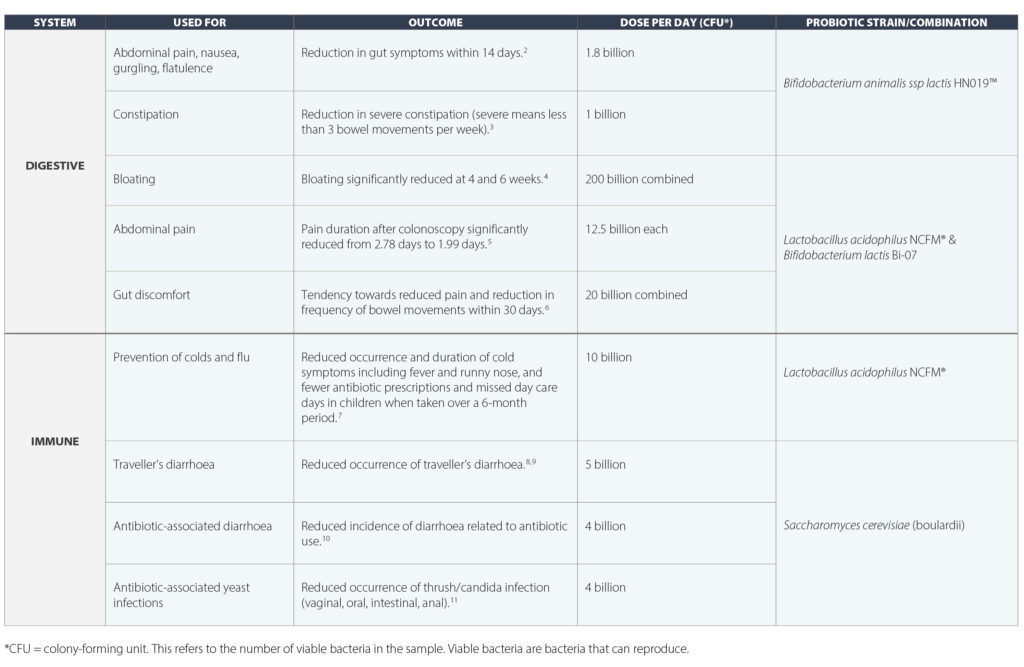As you read this, approximately 38 trillion microbes are living out their lives within your gut – foraging for food, jostling with each other for survival and reproducing. This is your microbiome, the ecosystem of bacteria, yeasts, and fungi that work synergistically with your body to keep you healthy.
The health of your gut microbiome is intimately linked with your own health, particularly influencing your digestion and immune function.
The health of your gut microbiome is intimately linked with your own health, particularly influencing your digestion and immune function. However, factors like stress, illness, antibiotics and processed foods can reduce the amount of ‘good microbes’, and allow ‘bad’ microbes to prosper. The imbalance that follows this can interrupt your digestive function, creating symptoms like bloating, diarrhoea, constipation or abdominal pain, and reduce your capacity to fight pathogens,[1] leading to colds, flu and infections.
Fortunately, taking probiotics can help restore and maintain the microbial balance in your gut, improving the health of your digestive and immune systems. It is important to note, however, in terms of manufacturing processes, quality of ingredients and the strains used, not all probiotics are created equal. So if you’re struggling with gut or immune issues, read on to find out how you can choose the best probiotic for you.

The right dog for the job
Expecting any probiotic formulation to address a specific health concern is like expecting a stray dog to herd sheep. Although the stray is a dog, not knowing its breed or skills makes putting it in charge a risky move.
Expecting any probiotic formulation to address a specific health concern is like expecting a stray dog to herd sheep.
Probiotics are the same. When you’ve got a specific health outcome in mind, using any general probiotic is less likely to lead to the results you’re looking for. This is because different probiotic strains have specific strengths or actions in the body. Simply put, no probiotic can do everything.
Therefore, to achieve your desired results, it’s important to choose strains that can produce the effect you want, just as you’d specifically choose a Border Collie, and not a random stray, to herd your sheep.
Then, once you’ve got the right strain, it’s important to choose an evidence-based dose of a probiotic, because one strain can have different effects at different doses. For further information on using probiotics in this strain and dose-specific way (and more dog analogies!), read this post.
Simply put, no probiotic can do everything.
So, what will you choose?
The best way to choose a probiotic strain for your condition is to look at what the science says. If you don’t feel inclined to wade through the research, don’t worry! The following table will introduce you to some specific probiotic strains that are well-researched in humans and have been shown to benefit particular digestive and immune issues.

[1] Weiss GA, Hennet T. Mechanisms and consequences of intestinal dysbiosis. Cell Mol Life Sci. 2017 Aug 1;74(16):2959-77. doi: 10.1007/s00018-017-2509-x
[2] Waller PA, Gopal PK, Leyer GJ, Ouwehand AC, Reifer C, Stewart ME, et al. Dose-response effect of Bifidobacterium lactis HN019 on whole gut transit time and functional gastrointestinal symptoms in adults. Scand J Gastroenterol. 2011 Sep;46(9):1057-64. doi: 10.3109/00365521.2011.584895.
[3] Ibarra A, Latreille-Barbier M, Donazzolo Y, Pelletier X, Ouwehand A C. Effects of 28-day Bifidobacterium animalis subsp. lactis HN019 supplementation on colonic transit time and gastrointestinal symptoms in adults with functional constipation: A double-blind, randomized, placebo-controlled, and dose-ranging trial. Gut Microbes. 2018; 9(3): 236–251. doi: 10.1080/19490976.2017.1412908
[4] Ringel Y, Ringel-Kulka T, Palsson OS, Maier D, Carroll I, Galanko JA, et al. Probiotic bacteria Lactobacillus acidophilus NCFM and Bifidobacterium lactis Bi-07 versus placebo for the symptoms of bloating in patients with functional bowel disorders: a double-blind study. J Clin Gastroenterol. 2011 Jul;45(6):518-25. doi: 10.1016/S0016-5085(08)62560-3.
[5] D’Souza B, Slack T, Wong SW, Lam F, Muhlmann M, Koestenbauer J, et al. Randomized controlled trial of probiotics after colonoscopy. ANZ J Surg. 2017 Sep;87(9):E65-E69. PMID:26183594
[6] Ringel-Kulka T, Goldsmith JR, Carroll IM, Barros SP, Palsson O, Jobin C et al. Lactobacillus acidophilus NCFM affects colonic mucosal opioid receptor expression in patients with functional abdominal pain – a randomised clinical study. Aliment Pharmacol Ther. 2014 Jul;40(2):200-7. PMID: 24853043
[7] Ibarra A, Latreille-Barbier M, Donazzolo Y, Pelletier X, Ouwehand A C. Effects of 28-day Bifidobacterium animalis subsp. lactis HN019 supplementation on colonic transit time and gastrointestinal symptoms in adults with functional constipation: A double-blind, randomized, placebo-controlled, and dose-ranging trial. Gut Microbes. 2018; 9(3): 236–251. doi: 10.3109/00365521.2011.584895
[8] Kollaritsch H, Kremsner P, Wiedermann, G, Scheiner O. Prevention of traveller’s diarrhea: comparison of different non-antibiotic preparations. Travel Med Internatl. 1989;7:9-18.
[9] Kollaritsch H, Holst H, Grobara P, Wiedermann G. Prevention of traveler’s diarrhea with Saccharomyces boulardii. Results of a placebo controlled double-blind study. Fortschr Med. 1993 Mar 30;111(9):152-6.
[10] McFarland LV. Systematic review and meta-analysis of Saccharomyces boulardii in adult patients. World J Gastroenterol. 2010 May 14;16(18):2202-22. PMID: 20458757
[11] Adam M, et al. Controlled double blind clinical trials of Saccharomyces boulardii: Multicentre study involving 25 physicians and 388 cases. Med Chirurg Dig. 1976:5(6);401-406.









Leave a Comment